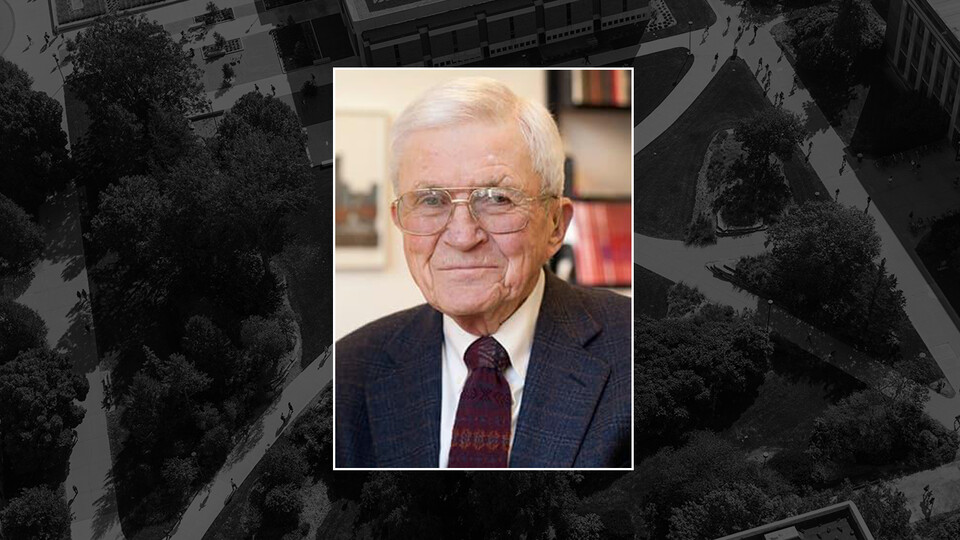University Communication and Marketing, January 6, 2022
Nebraska chemist’s breakthrough expanded scientific understanding, measurement
MCLAFFERTY EXCELLED IN LABORATORY RESEARCH AFTER DECORATED WWII SERVICE
Fred W. McLafferty, 98, University of Nebraska alumnus, decorated veteran and pioneering scientist in the field of gas chromatography-mass spectrometry, died Dec. 26 in Ithaca, New York.
McLafferty, who earned Bachelor of Science (1943) and Master of Science (1947) degrees from the University of Nebraska, was most recently the Peter J.W. Debye Professor of Chemistry (emeritus) at Cornell University.
“Fred McLafferty had deep roots in Nebraska and at UNL, and was a true pioneer in mass spectrometry, from small-molecule-gas phase chemistry to high resolution work with proteins at the modern frontier,” said David Berkowitz, Willa Cather Professor of Chemistry at the University of Nebraska–Lincoln and director of the National Science Foundation’s Chemistry Division. “He was both a remarkable innovator and a superb mentor — many of the leading scientists in the field today cut their teeth in Fred’s laboratory.
“He leaves a profound mark in science with a distinct Nebraska flair.”
Born on May 11, 1923 in Evanston, Illinois, McLafferty’s family moved to his mother’s family farm in Nuckolls County, Nebraska, following the start of the Great Depression. His father died of a staph infection when McLafferty was 16. His mother got a job teaching in Omaha and McLafferty went on to graduate from Omaha North High School in 1940.
In three years, he earned a bachelor’s degree at Nebraska U, graduating in 1943. He enlisted in the Army after graduation and served on the front lines in France and Germany during World War II. As an infantryman, McLafferty received the Combat Infantryman Badge, a Purple Heart and five Bronze Star Medals for valor. His unit also received the Presidential Unit Citation and liberated a concentration camp in Germany.
At the end of the war, McLafferty returned to the University of Nebraska to earn a Master of Science in chemistry. During that time, he met his future wife, Elizabeth “Tibby” Curley. The couple were married for more than 73 years.
McLafferty received a doctorate in chemistry from Cornell in 1950 and completed post-doctoral work at the University of Iowa. His professional career, including pioneering work with mass spectrometry, began in 1950 with Dow Chemical Company. Five years later, McLafferty and Roland Gohlke coupled a homemade gas chromatograph to a mass spectrometer, creating the first gas chromatograph-mass spectrometer, an instrument that can identify substances (even at trace levels) within a test sample. Through continued development, the device has become an invaluable analytical tool used across scientific disciplines.
McLafferty’s work in mass spectrometry included the study of gaseous ion reactions, instrumentation, high-resolution analysis, data interpretation and the collection and use of reference spectra. In 1959, he wrote an article that insightfully described a complex chemical rearrangement — which is known as the “McLafferty Rearrangement,” the only named reaction in the field and one taught to most undergraduate chemistry students.
His research brought a new understanding to many areas of chemistry beyond mass spectrometry. He co-authored/edited more than 500 articles, five books, and a widely-adopted registry of mass spectral data. These approaches and innovations are widely used in analyzing, developing, and detecting compounds from environmental pollutants to pharmaceutical products to proteins and RNA. Recently, he pioneered new techniques for identifying large, complex proteins and their assemblies via mass spectrometry.
His book, “Interpretation of Mass Spectral Data,” remains a leading text in the field.
McLafferty, the founding director of the Dow Framingham Eastern Research Lab, joined the faculty at Purdue University as a professor of chemistry in 1964 and, in 1968, moved to Cornell University.
“(Fred) was the ambassador of mass spectrometry, teaching and training, guiding the field to its present high utility and impact in chemistry, biochemistry, biology and medicine,” said Mike Gross, who studied under McLafferty and served as a professor of chemistry at the University of Nebraska–Lincoln from 1968 to 1994. Gross, who is a professor at Washington University in St. Louis, founded the Journal of the American Society for Mass Spectrometry while at Nebraska and sponsors the Michael L. Gross Award Lecture.
In recognition of his scientific advancements, McLafferty was awarded honorary doctorates from the universities of Nebraska, Liege and Purdue, along with numerous international medals and honors. He was an elected member of the U.S. National Academy of Sciences, the highest honor available to U.S. scientists, and of the American Academy of Arts and Sciences.
McLafferty is survived by his wife, Tibby; his children, Ann (Koko Diaz), Martha (Jonathan Skinner), Joel and Sara (Avijit Ghosh); daughter-in-law, Vera; and 10 grandchildren.
He was preceded in death by his son, Samuel A. McLafferty; parents, Joel E. and Margaret Keifer McLafferty; and siblings, Lucy and Charles.
A symposium in his honor will be held when conditions permit. Burial will be family-only at Lake View Cemetery in Ithaca.
In lieu of flowers, the family requests donations to the Fred McLafferty Fund in Chemistry and Chemical Biology (#0009443), Department of Chemistry, Cornell University, Ithaca, NY 14850.
A family obituary, which includes opportunities to share memories, is available here.






